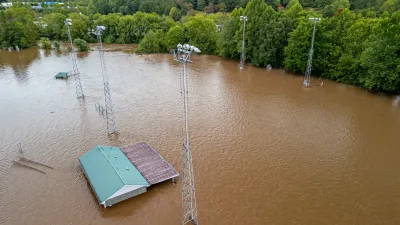In the "Room for Debate" section of The New York Times, five experts debate whether the federal government should continue to subsidize the cost of coastal reconstruction in the aftermath of storms.
"Should the federal government stop helping to rebuild properties in areas vulnerable to natural disasters? Would it make sense for the federal and local governments to buy such land, to prevent future loss of homes and lives?" These are among the questions considered by debaters from Taxpayers for Common Sense, the Joint Center for Political and Economic Studies, the Insurance Institute for Business & Home Safety, the University of California, Santa Barbara, and the Institute of Marine and Coastal Sciences at Rutgers University.
From Steve Ellis, the vice president of Taxpayers for Common Sense:
"Politicians miss the point when they grab a megaphone and cry out that we will rebuild. We need to rebuild smarter and better. Not just homes and businesses, but policies, programs and projects, ensuring we aren’t encouraging development in harm’s way....No one is suggesting we move the entire New Jersey seacoast. But we can buy out and encourage mitigation of the most vulnerable properties. Every dollar in mitigation saves four in recovery."
From Ralph B. Everett, president and chief executive of the Joint Center for Political and Economic Studies:
"But let us also remember that four-fifths of Americans live in counties where natural disasters have been declared in just the past six years. Last year, Hurricane Irene ravaged communities hundreds of miles from the coastline. Should we not rebuild in these communities, as well? Over the past two years, record numbers of tornados have hit in the South. Should we no longer rebuild after a twister hits?...We have to stay focused, above all else, on fundamentally transforming the way we use energy, with policies that spur the markets to promote large-scale energy efficiency and low-carbon, renewable sources of energy."
FULL STORY: Washed Away by Storms, Rebuilt by Taxpayers

Planetizen Federal Action Tracker
A weekly monitor of how Trump’s orders and actions are impacting planners and planning in America.

Maui's Vacation Rental Debate Turns Ugly
Verbal attacks, misinformation campaigns and fistfights plague a high-stakes debate to convert thousands of vacation rentals into long-term housing.

San Francisco Suspends Traffic Calming Amidst Record Deaths
Citing “a challenging fiscal landscape,” the city will cease the program on the heels of 42 traffic deaths, including 24 pedestrians.

Defunct Pittsburgh Power Plant to Become Residential Tower
A decommissioned steam heat plant will be redeveloped into almost 100 affordable housing units.

Trump Prompts Restructuring of Transportation Research Board in “Unprecedented Overreach”
The TRB has eliminated more than half of its committees including those focused on climate, equity, and cities.

Amtrak Rolls Out New Orleans to Alabama “Mardi Gras” Train
The new service will operate morning and evening departures between Mobile and New Orleans.
Urban Design for Planners 1: Software Tools
This six-course series explores essential urban design concepts using open source software and equips planners with the tools they need to participate fully in the urban design process.
Planning for Universal Design
Learn the tools for implementing Universal Design in planning regulations.
Heyer Gruel & Associates PA
JM Goldson LLC
Custer County Colorado
City of Camden Redevelopment Agency
City of Astoria
Transportation Research & Education Center (TREC) at Portland State University
Jefferson Parish Government
Camden Redevelopment Agency
City of Claremont





























